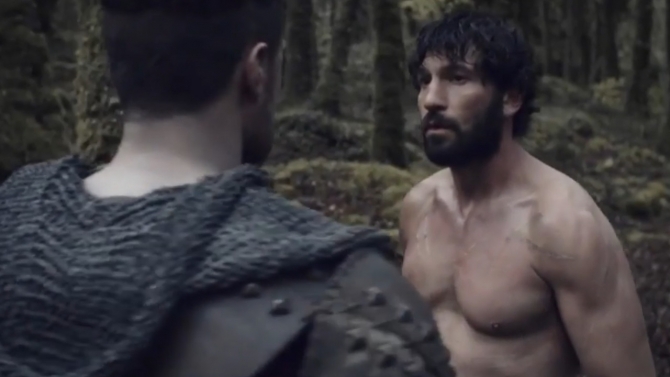Part of the Edinburgh International Film Festival
In 13th Century Ireland, an order of monks are forced to assist in transporting their sacred relic to Rome by the intensely devout Brother Geraldus (Stanley Weber). Along their journey, the monks face threats from not only the seemingly-savage Gaels that reside in the forest, but also from the Norman knights assigned to accompany them. Their leader, Raymond de Merville (Richard Armitage) not only wants the relic for himself, but is suspicious about the mysterious past of the monks’ mute servant (Jon Bernthal).
Muldowney aims for a sense of authenticity in his depiction of the monks that initially appears refreshing, with the film spending its early scenes using almost entirely Gaelic for their dialogue. However, this approach becomes inconsistent later in the film, with the monks switching between Gaelic and English. Whilst this approach makes sense when they are speaking to Geraldus and the Norman characters, it is less understandable, except for commercial reasons, that the monks would speak English to each other.
Whilst this may seem like a minor point of contention, this lack of internal consistency reflects the somewhat half-hearted execution of the film in general. In particular, the treatment of the relic makes it unclear whether it is meant to hold vague mystical powers or whether it is a mere rock used to justify acts of warfare, as seen by the motivations of Geraldus and Raymond.
Characterisation is similarly two-dimensional, with the monks, and Tom Holland’s naive Brother Diarmuid in particular, being portrayed as simple men of God, whilst Geraldus and Raymond become the main antagonists. Geraldus in particular spews Christian fundamentalist rhetoric and propagates the idea of a third Crusade to Diarmuid, with little attempt to make him anything more than a villainous archetype. Likewise, Bernthal’s mysterious past is not elaborated on, with the character of the mute being given little else to do than glower and participate in the film’s admittedly well-choreographed, but infrequent, fight scenes.
These shortcomings may be partially due to the film’s relatively brief running time, with the third act in particular feeling somewhat rushed. It’s possible another half-hour would have helped to flesh out the characters and provide them with more than basic motivations. Despite this, the overall performances are very good, with Weber in particular conveying Geraldus’ increasingly manic religious fervour as the journey and film progresses.
Pilgrimage is a film that aims to present an atmospheric medieval adventure that also questions ideas of faith, but sadly falls short due to its muddled execution and compromised pacing.


Comments